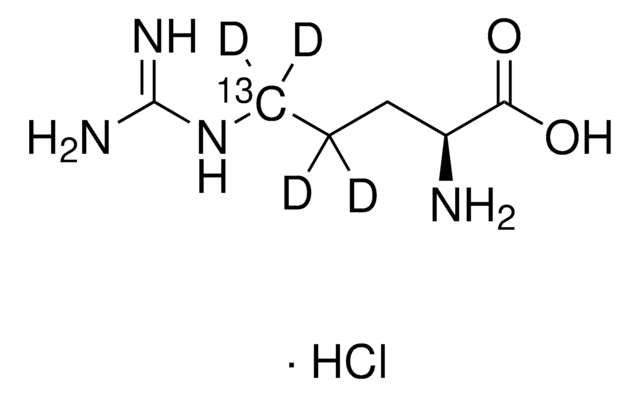608033
L-Arginine-13C6,15N4 hydrochloride
99 atom % 13C, 99 atom % 15N, 95% (CP)
Sinónimos:
SILAC Amino Acid, (S)-(+)-2-Amino-5-[(aminomethyl)amino]pentanoic acid-13C6,15N4 hydrochlordie, 13C and 15N Labeled ARG, 13C and 15N Labeled arginine hydrochloride
About This Item
Productos recomendados
isotopic purity
99 atom % 13C
99 atom % 15N
Quality Level
assay
95% (CP)
form
solid
optical activity
[α]20/D +22°, c = 12 in 10% HCl
composition
L-isomer, 97%
technique(s)
bio NMR: suitable
protein expression: suitable
mp
226-230 °C (dec.) (lit.)
mass shift
M+10
SMILES string
Cl.[15NH2][13C@@H]([13CH2][13CH2][13CH2][15NH][13C]([15NH2])=[15NH])[13C](O)=O
InChI
1S/C6H14N4O2.ClH/c7-4(5(11)12)2-1-3-10-6(8)9;/h4H,1-3,7H2,(H,11,12)(H4,8,9,10);1H/t4-;/m0./s1/i1+1,2+1,3+1,4+1,5+1,6+1,7+1,8+1,9+1,10+1;
InChI key
KWTQSFXGGICVPE-YAUSPDTOSA-N
Categorías relacionadas
Application
Packaging
related product
Storage Class
11 - Combustible Solids
wgk_germany
WGK 3
flash_point_f
Not applicable
flash_point_c
Not applicable
Certificados de análisis (COA)
Busque Certificados de análisis (COA) introduciendo el número de lote del producto. Los números de lote se encuentran en la etiqueta del producto después de las palabras «Lot» o «Batch»
¿Ya tiene este producto?
Encuentre la documentación para los productos que ha comprado recientemente en la Biblioteca de documentos.
Los clientes también vieron
Contenido relacionado
La estructura de las proteínas proporciona información valiosa que puede utilizarse para inferir la función de la proteína. El estudio de la estructura de las proteínas y la cartografía de las interacciones proteicas, los niveles de expresión y su ubicación permiten la identificación de biomarcadores de enfermedad y posibles dianas farmacológicas para el tratamiento terapéutico.
La estructura de las proteínas proporciona información valiosa que puede utilizarse para inferir la función de la proteína. El estudio de la estructura de las proteínas y la cartografía de las interacciones proteicas, los niveles de expresión y su ubicación permiten la identificación de biomarcadores de enfermedad y posibles dianas farmacológicas para el tratamiento terapéutico.
Protein structure analysis aids in identifying disease biomarkers and drug targets crucial for therapeutic treatments.
Protein structure analysis aids in identifying disease biomarkers and drug targets crucial for therapeutic treatments.
Nuestro equipo de científicos tiene experiencia en todas las áreas de investigación: Ciencias de la vida, Ciencia de los materiales, Síntesis química, Cromatografía, Analítica y muchas otras.
Póngase en contacto con el Servicio técnico












